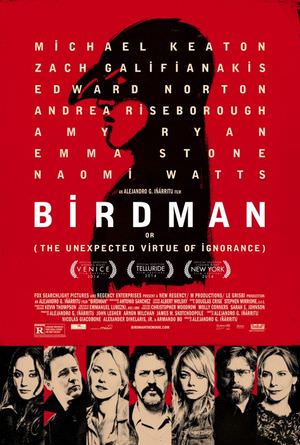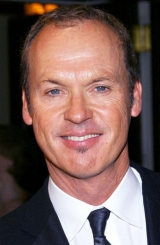Birdman

Movie Info
Synopsis
A fading actor (Michael Keaton) best known for his portrayal of a popular superhero attempts to mount a comeback by appearing in a Broadway play. As opening night approaches, his attempts to become more altruistic, rebuild his career, and reconnect with friends and family prove more difficult than expected. Lindsay Duncan, Zach Galifianakis, and Edward Norton co-star in this black comedy from Biutiful director Alejandro González Iñárritu.Wikipedia
Starring Cast
Birdman Reviews
9
It’s an entirely different beast from his previous gems Amores Perros and Babel, but it’s a film so smart, it’ll leave you giddy with pleasure.
8
What adds to the viewing experience and enhances the psychological effect of the film, is its frenzied background score. Its adrenaline packed leitmotif of the drum score by Antonio Sanchez is effectively used to create and drive home the point of the insanity prevalent in the narration.Overall, the film is a must watch for its unconventional presentation, style and performances.
8
Birdman, in its 122 minutes' runtime, transforms into exhilarating cinema that gives a heady rush.
8
Birdman is unexpectedly funny and a thoroughly entertaining film.
10
Birdman is not just a film, it is an experience and a highly exhilarating one at that. Alejandro González Iñárritu has made quite a few memorable films (Amores Perros, 21 Grams, Babel) but with Birdman, he has not just pushed the envelope he has pushed the whole post office itself.
-
If you find a movie better than Birdman, I’ll clip off my wings, bathe in batter and offer myself on the platter at the nearest KFC.
8
Birdman is an impeccable film. It boasts earnest performances by its esteemed cast members and also has a tight storyline. Iñárritu knows what he wants to say and does exactly that. The underlying message of vanity and perils of fame also resound in the script, and stay with you even as the credits roll. It is perhaps the best film of 2014 and deserves to be watched.
-
Birdman embraces the meta-narrative by becoming the duality it explores — the real and the make-believe. At any point, Birdman leaves it open to interpretation whichever way you want to interpret it because it is both. A serious arthouse film wearing a funny movie mask.
Audience Reviews for Birdman
-
Excellent .
Best : Cinematography , Acting , Direction , musical score
Weakness : looks more interested in process than product4May 18, 17 -
They made this film in one take. I reviewed it in one sentence.
Every once in a particularly blue moon comes a film that grabs you by the gut and refuses to let go, a film so dazzlingly original that you remain bewitched by its sheer audaciousness for days on end, and this is exactly what Birdman is – one of the wittiest, most well thought-out, and, might I add, trippiest films in recent memory, but that is hardly a surprise, given the fact that it was directed by acclaimed Mexican director Alejandro Gonzalez Innaritu, until now famous for helming the direction of devastating, emotionally-wrecking films like Love’s a Bitch, Babel and Biutiful, who takes a complete detour here and delivers a complete rollercoaster of a ride, a film so ridiculously smart and funny, it will leave you feeling satiated the way few films have ever managed to, and this is largely due to its absolute cracker of a script, the basic gist of which is as follows – Riggan Thomson (Michael Keaton in a killer comeback performance) is a complete washout of an actor, a man famous for playing the eponymous role in the Birdman trilogy of films that came out in the early 90s, a period when he experienced much appreciation, power and fame, and now two decades later, having refused a lucrative offer of starring in the fourth installment of the franchise, he is eager to make a comeback, writing, directing and starring in an adaptation of a Raymond Carver short story titled “What We Talk About When We Talk About Love” for Broadway at the prestigious St. James Theatre in New York, but Riggan has his task cut out big time, for there are a number of people who throw a spanner in his works – an egotistical star Mike Shiner (played by an excellent Edward Norton) who wrecks a preview of the play just because the gin he received on stage was water and not gin (and one who believes in getting an erection on stage to get into the skin of his character to boot), an ex-drug addict of a daughter, Sam (played by the gorgeous, gorgeous Emma Stone) who constantly berates him for his lack of recognition of the vitality of social media in an age of selfies and Twitter, a batty old theatre critic called Tabitha Dickenson (Lindsay Duncan), his primary nemesis, who is hell-bent upon trashing his film in the New York Times and completely destroying his play, a girlfriend named Laura (played by Andrea Risenborough) who might be pregnant, an ex-wife who constantly visits him (Amy Ryan in a stellar role) who, in one of the film’s most hilarious scenes, reminds Riggan how he had thrown a kitchen-knife at her and minutes later declared his love for her, and, most of all, his alter-ego Birdman, a voice in his head that constantly criticizes his choice of Broadway as a medium for staging a comeback when all someone in his position really has to do is go back to playing those superhero roles he is so well-known for, and one that drives him to imagine the craziest of visions (not least of all the film’s very opening scene in which we see him levitating three feet above the ground and which pretty much sets us up for the outrageousness that is set to follow) – and needless to say, Riggan encounters one hurdle after another, even leaving him at a point where he believes all is lost and there is no hope of redemption, and whether or not he manages to overcome this lies at the very crux of this incredible film, one that is made even more incredible by its genius, genius cinematographer, Emmanuel Lubezki, better known in film-circles as Chivo (Spanish for goat), but what he manages to accomplish here is hardly the work of one, for he manages to make our jaws drop in collective wonder and remain there for the entirety of the film’s duration, admittedly something that was expected, given the fact that this is a man who had earlier delivered a sucker punch with his thrilling camerawork in Alfonso Cuaron’s Gravity (and much deservedly won Oscar acclaim for it as well), but what Lubezki manages to achieve here is unprecedented and something that has only been seen earlier in master filmmaker Alfred Hitchcock’s Rope – he gives us the impression that the entire film, barring the last few minutes, has been shot in a single take, for the camera just keeps moving from stage to the terrace of St. James Theatre to the streets of New York in a fluid, breathtaking manner – and this is all the more admirable, given the fact that Innaritu took all of 30 days to complete shooting for this film, which, needless to say, would have involved an unbelievable, unbelievable amount of preparation and rehearsals from everyone involved in this outrageous project, from the actors themselves to the technicians and cameramen, for even the tiniest of mistakes, a tiny slip here, a mispronounced syllable there, would render the efforts of everyone else in that same take worthless and of no use, and as a result, let the entire crew down, which just goes to show how admirable it is that the entire film was shot in such an incredibly short span of time, but Lubezki and Innaritu have never been ordinary mortals, and here, in the best work of their respective filmographies, they amply demonstrate how filmmaking can be elevated by gifted craftsmen like them from a simple art to a work of awe-inspiring beauty, but let us digress from that for a moment and dwell upon the many nuances that the film has to offer, and nuances there are aplenty, for this a film with many layers, a film with subtext beneath its glossy, shining veneer, a film that manages to cunningly sneak home a point or two about celebrity culture, mankind’s eternal need for recognition, and egotism even as it constantly bedazzles us with its sheer visual glory, which are pretty much running themes that serve as the backbone of this enterprise for the entirety of its running time, and this is perhaps best demonstrated in one of the film’s most powerful scenes that Emma Stone pretty much knocks out of the park, featuring a devastating monologue she delivers in sheer frustration at her father’s almost self-debilitating desire for fame and power, and his complete (thus far) ineptitude in achieving the same, and another one in which the play’s producer and Riggan’s best friend (played by an amiable Zach Galifianakis, in a complete U-turn from his The Hangover days) insists that Mike continue to remain on the play’s cast for the massive star power he enjoys, which alone was responsible for most of the preview audience coming in in the first place, this despite him having publicly humiliated Riggan and nearly wrecked the entire play itself – it’s a scene that speaks volumes about our obsession with stars and how production values and pretty much anything else in theatre will always take a back seat, one that hauntingly reminds us of ourselves even, and therein lies the power of this audacious film, a film laced with dialogue so rich it packs the power of dynamite – for instance, in response to Riggan reprimanding him for his outrageous actions a few minutes ago, Mike nonchalantly replies, “Popularity is the slutty little cousin of prestige, my friend”, and “That’s a nice bird, man!” as he eats fried chicken in the wreck that the stage is, even while a horrified Riggan looks on in utter disbelief, a disbelief that we as an audience share incidentally, for I can’t remember the last time that a film managed to enthrall so much, a film that grabs one by the balls and delivers a shot of adrenaline so acute it will leave one giddy with pleasure, and it is the wittiness of the writing and the laudable originality of the script that help elevate this sensation of awe-inspired wonder to an entirely new level, besides an absolute cracker of a soundtrack by Antonio Sanchez that is mostly jazz-based, the constant and feverish beating of the drums pretty much making me want to leave everything else and headbang for as long as my neck can hold, and that, ladies and gentleman, is the power of a good background score – it unfolds in a joyous, all-pervasive narrative of its own, and considering all this, one can’t help but acknowledge that Birdman is one of the most technically proficient films to have come out of Hollywood in recent memory, and this is a welcome, joyous landmark for an industry that is otherwise much dreaded as an assembly-line of brain-dead big-budget crap that it somehow manages to churn out week upon week, year after year (are you listening, Michael Bay?), and this is why we should appreciate this little gem all the more and give it all the recognition it so rightfully deserves, besides sparing a thought for the magnificent Michael Keaton, who, like the character he plays, pretty much faded away from public memory and cinema after starring as Batman in two of Tim Keaton’s films, an actor who deserved so much more with the sheer wealth of talent he has on offer but ended up getting sidelined in favour of the Adam Sandlers and Zac Efrons of a film industry that is barely capable of recognizing genuine, once-in-a-generation talent for what it is worth, and for that, we must doff our hats to Innaritu, a master filmmaker in complete control of his craft, indeed something that very few of his contemporaries, Wes Anderson for instance, can claim to be, and a man who has managed to pull off one of the greatest, most awe-inspiring miracles in the history of modern cinema: that glorious, glorious single take (it did contain a negligible number of cuts, but Lubezki knows his cinematography better than anyone else) is something that will be discussed and scrutinized closely in film circles for as long as movies are around, but in a film like this, almost anything (and everything) can’t help but appear to be a tiny miracle in itself, given the sheer quality of filmmaking that is on display here, and Innaritu does appear to be a modern-day version of Midas, a master who changes anything he touches on the film set to gold – needless to say, this is a glorious, much-needed moment for indie filmmakers and connoisseurs of quality cinema alike, and I can’t help but feel that is a film that SHOULD sweep a majority of the Oscars that it has been nominated for but will not, given the Academy’s propensity for feel-good dramas and coming of age films, films that mostly come with a baggage of self-importance attached to them (Twelve Years A Slave…really???), but groundbreaking achievements like these don’t really need a golden statuette to confirm their merit, for this is a film that any true lover of films and what they stand for will appreciate, a film that packs a punch and yet manages to remain frighteningly intelligent at the same time, and now that I have raved on and on for nearly two thousand words about how good this masterpiece is, throw aside anything else that you are doing, visit the nearest multiplex and soak in the glory of Innaritu’s creation for all its worth, for it is an experience that is best enjoyed on the biggest of big screens that you can ever find, and watching it will be tantamount to watching your perception of what cinema can be change before your very eyes – for this is a film that belongs to the biggest of big leagues, one that you will be very unlikely to ever forget in the near future – so go ahead, experience an incredible journey that is as much a life-altering experience as it is a film about life itself, and on this rather fanboyish note, let me conclude with a quote by our winged hero himself: “Let’s go back one more time and show them what we are capable of!”3January 12, 17 -
Critics special movie. Filled with amazing successful technical experiments like continuity shots, steady-cam, stage lighting, close-ups, etc. (I am not specialise in these technical name, but I loved it.)
Ending was bit confusing and hidden with meanings and theories.
Overall this is "Oscar Material" as I call it.2May 23, 15



















